

December 4 – 10: “Are author blurbs as effective today as they used to be?”
 This week we welcome ITW Members Tim Tigner, Colin Campbell, Matt Coyle, Carole Price, Khaled Talib, Lynn Cahoon, Jon Land, James L’Etoile, Douglas Wynne, Victoria Gilbert and Luke Murphy as they discuss whether or not author blurbs are as effective today as they used to be? Scroll down to the “comments” section for this can’t-miss discussion!
This week we welcome ITW Members Tim Tigner, Colin Campbell, Matt Coyle, Carole Price, Khaled Talib, Lynn Cahoon, Jon Land, James L’Etoile, Douglas Wynne, Victoria Gilbert and Luke Murphy as they discuss whether or not author blurbs are as effective today as they used to be? Scroll down to the “comments” section for this can’t-miss discussion!
~~~~~
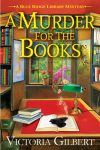 Victoria Gilbert, raised in the shadow of the Blue Ridge Mountains, turned her early obsession with reading into a dual career as an author and librarian. She has worked as a reference librarian, research librarian, and library director. A member of International Thriller Writers, Sisters in Crime, and Mystery Writers of America, she lives in North Carolina with her husband, son, and some very spoiled cats.
Victoria Gilbert, raised in the shadow of the Blue Ridge Mountains, turned her early obsession with reading into a dual career as an author and librarian. She has worked as a reference librarian, research librarian, and library director. A member of International Thriller Writers, Sisters in Crime, and Mystery Writers of America, she lives in North Carolina with her husband, son, and some very spoiled cats.
 Tim Tigner writes fast-paced conspiracy thrillers with the tagline: Devious Devices, International Intrigue, and the Deadly Mistake of Messing with the Wrong Guy. His stand-alones include international bestsellers Coercion, Betrayal, and Flash. His recent focus had been on the Kyle Achilles series, which includes Pushing Brilliance, The Lies of Spies, and now FALLING STARS. A Soviet Counterintelligence Specialist and Veteran of the Green Berets, Tim worked out of Moscow throughout perestroika, Brussels during the formation of the EU, and more recently Silicon Valley as a startup CEO. Tim began writing thrillers in 1996 from an apartment overlooking Moscow’s Gorky Park. Twenty years later, the view from his desk is a vineyard in Northern California, where he lives with his wife Elena and their two daughters. Tim earned a BA in Philosophy and Mathematics from Hanover College, and an MA and MBA from the University of Pennsylvania.
Tim Tigner writes fast-paced conspiracy thrillers with the tagline: Devious Devices, International Intrigue, and the Deadly Mistake of Messing with the Wrong Guy. His stand-alones include international bestsellers Coercion, Betrayal, and Flash. His recent focus had been on the Kyle Achilles series, which includes Pushing Brilliance, The Lies of Spies, and now FALLING STARS. A Soviet Counterintelligence Specialist and Veteran of the Green Berets, Tim worked out of Moscow throughout perestroika, Brussels during the formation of the EU, and more recently Silicon Valley as a startup CEO. Tim began writing thrillers in 1996 from an apartment overlooking Moscow’s Gorky Park. Twenty years later, the view from his desk is a vineyard in Northern California, where he lives with his wife Elena and their two daughters. Tim earned a BA in Philosophy and Mathematics from Hanover College, and an MA and MBA from the University of Pennsylvania.
![]() Ex army, retired cop and former Scenes Of Crime Officer. Colin Campbell is the author of British crime novels Blue Knight White Cross, and Northern Ex, and US thrillers Jamaica Plain, Montecito Heights, Adobe Flats and Snake Pass. His Jim Grant thrillers bring a rogue Yorkshire cop to America, where culture clash and violence ensue.
Ex army, retired cop and former Scenes Of Crime Officer. Colin Campbell is the author of British crime novels Blue Knight White Cross, and Northern Ex, and US thrillers Jamaica Plain, Montecito Heights, Adobe Flats and Snake Pass. His Jim Grant thrillers bring a rogue Yorkshire cop to America, where culture clash and violence ensue.
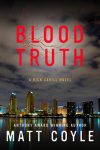 Matt Coyle knew he wanted to be a crime writer when he was fourteen and his father gave him The Simple Art of Murder by Raymond Chandler. His debut novel, Yesterday’s Echo, won the Anthony Award for Best First Novel, the San Diego Book Award for Best Mystery, the Ben Franklin Award for Best New Voice in Fiction. Night Tremors was a Bookreporter.com Reviewers’ Favorite Book of 2015 and was an Anthony, Shamus, and Lefty Award finalist. Dark Fissures, the third book in the Rick Cahill crime series, was a finalist for the Macavity and Lefty awards and was a 2016 Top Pick for Bookreporter.com. BLOOD TRUTH is Matt’s fourth novel. Matt is a graduate of UC Santa Barbara and lives in San Diego with his yellow Lab, Angus, where he is writing the fifth Rick Cahill crime novel.
Matt Coyle knew he wanted to be a crime writer when he was fourteen and his father gave him The Simple Art of Murder by Raymond Chandler. His debut novel, Yesterday’s Echo, won the Anthony Award for Best First Novel, the San Diego Book Award for Best Mystery, the Ben Franklin Award for Best New Voice in Fiction. Night Tremors was a Bookreporter.com Reviewers’ Favorite Book of 2015 and was an Anthony, Shamus, and Lefty Award finalist. Dark Fissures, the third book in the Rick Cahill crime series, was a finalist for the Macavity and Lefty awards and was a 2016 Top Pick for Bookreporter.com. BLOOD TRUTH is Matt’s fourth novel. Matt is a graduate of UC Santa Barbara and lives in San Diego with his yellow Lab, Angus, where he is writing the fifth Rick Cahill crime novel.
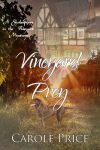 Carole Price is a Buckeye! Born and raised in Columbus, Ohio, she attended Ohio State University. She worked for a national laboratory in northern California before turning to writing mysteries. Carole fell in love with the Bard after attending plays at the Oregon Shakespeare Festival in Ashland. She graduated from the Citizens Police Academy and is an active police volunteer for the Livermore Police Department, a member of Mystery Writers of America, Sisters in Crime, and International Thriller Writers. She actively promotes her books at conferences, literary groups, and many other venues. Carole and her husband reside in the San Francisco Bay Area in the middle of wine country.
Carole Price is a Buckeye! Born and raised in Columbus, Ohio, she attended Ohio State University. She worked for a national laboratory in northern California before turning to writing mysteries. Carole fell in love with the Bard after attending plays at the Oregon Shakespeare Festival in Ashland. She graduated from the Citizens Police Academy and is an active police volunteer for the Livermore Police Department, a member of Mystery Writers of America, Sisters in Crime, and International Thriller Writers. She actively promotes her books at conferences, literary groups, and many other venues. Carole and her husband reside in the San Francisco Bay Area in the middle of wine country.
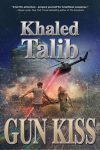 Khaled Talib is a former journalist with local and international exposure. His articles have been published and syndicated to newspapers worldwide, and his short stories have appeared in literary journals and magazines. The author, who has written three novels, resides in Singapore.
Khaled Talib is a former journalist with local and international exposure. His articles have been published and syndicated to newspapers worldwide, and his short stories have appeared in literary journals and magazines. The author, who has written three novels, resides in Singapore.
 Lynn Cahoon is the author of the New York Times and USA Today bestselling Tourist Trap cozy mystery series. GUIDEBOOK TO MURDER, book 1 of the series, won the Reader’s Crown for Mystery Fiction in 2015. She also pens the Cat Latimer series. A Story to Kill and Fatality in Firelight are available in mass market paperback. She lives in a small town like the ones she loves to write about with her husband and two fur babies.
Lynn Cahoon is the author of the New York Times and USA Today bestselling Tourist Trap cozy mystery series. GUIDEBOOK TO MURDER, book 1 of the series, won the Reader’s Crown for Mystery Fiction in 2015. She also pens the Cat Latimer series. A Story to Kill and Fatality in Firelight are available in mass market paperback. She lives in a small town like the ones she loves to write about with her husband and two fur babies.
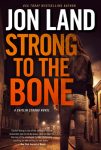 Jon Land is the USA Today bestselling author of 43 books, including eight titles in the critically acclaimed Caitlin Strong series: Strong Enough to Die, Strong Justice, Strong at the Break, Strong Vengeance, Strong Rain Falling (winner of the 2014 International Book Award and 2013 USA Best Book Award for Mystery-Suspense), Strong Darkness (winner of the 2014 USA Books Best Book Award and the 2015 International Book Award for Thriller) and Strong Light of Day which won the 2016 International Book Award for Best Thriller-Adventure, the 2015 Books and Author Award for Best Mystery Thriller, and the 2016 Beverly Hills Book Award for Best Mystery. Land has also teamed with New York Times bestselling author Heather Graham on a new sci-fi series, the first of which, The Rising, was published by Forge in January of 2017. Jon’s nonfiction titles include Betrayal (2011), winner of the 2011 International Book Award in True Crime and Takedown (2016) which won both 2016’s USA Best Books Award and the International Book Award in True Crime. His latest nonfiction title, No Surrender, was published by Post Hill Press on July 4. He is a 1979 graduate of Brown University and lives in Providence, Rhode Island.
Jon Land is the USA Today bestselling author of 43 books, including eight titles in the critically acclaimed Caitlin Strong series: Strong Enough to Die, Strong Justice, Strong at the Break, Strong Vengeance, Strong Rain Falling (winner of the 2014 International Book Award and 2013 USA Best Book Award for Mystery-Suspense), Strong Darkness (winner of the 2014 USA Books Best Book Award and the 2015 International Book Award for Thriller) and Strong Light of Day which won the 2016 International Book Award for Best Thriller-Adventure, the 2015 Books and Author Award for Best Mystery Thriller, and the 2016 Beverly Hills Book Award for Best Mystery. Land has also teamed with New York Times bestselling author Heather Graham on a new sci-fi series, the first of which, The Rising, was published by Forge in January of 2017. Jon’s nonfiction titles include Betrayal (2011), winner of the 2011 International Book Award in True Crime and Takedown (2016) which won both 2016’s USA Best Books Award and the International Book Award in True Crime. His latest nonfiction title, No Surrender, was published by Post Hill Press on July 4. He is a 1979 graduate of Brown University and lives in Providence, Rhode Island.
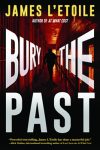 James L’Etoile has twenty-nine years of experience in prisons and jails across the country. As experienced associate warden, chief of institution operations, hostage negotiator, and director of parole with a master’s dredge in criminal justice, L’Etoile draws upon his background to bring his crime fiction to life. This is his second Detective Penley Mystery.
James L’Etoile has twenty-nine years of experience in prisons and jails across the country. As experienced associate warden, chief of institution operations, hostage negotiator, and director of parole with a master’s dredge in criminal justice, L’Etoile draws upon his background to bring his crime fiction to life. This is his second Detective Penley Mystery.
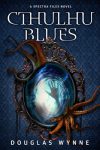 Douglas Wynne wrote his first dark fantasy novel at the age of fifteen but has never found the courage to take it down from the attic and read it. After a long detour through rock bands, and recording studios, he came full circle back to fiction writing and is recently the author of five novels: The Devil of Echo Lake, Steel Breeze, and the SPECTRA Files trilogy (Red Equinox, Black January, and CTHULHU BLUES). He lives in Massachusetts with his wife and son and a houseful of animals.
Douglas Wynne wrote his first dark fantasy novel at the age of fifteen but has never found the courage to take it down from the attic and read it. After a long detour through rock bands, and recording studios, he came full circle back to fiction writing and is recently the author of five novels: The Devil of Echo Lake, Steel Breeze, and the SPECTRA Files trilogy (Red Equinox, Black January, and CTHULHU BLUES). He lives in Massachusetts with his wife and son and a houseful of animals.
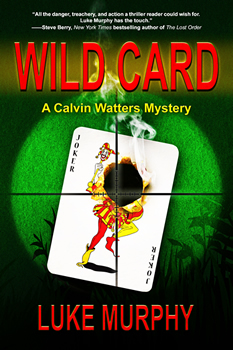 Luke Murphy is the International bestselling author of Dead Man’s Hand (Imajin Books, 2012) and Kiss & Tell (Imajin Books, 2015). Murphy played six years of professional hockey before retiring in 2006. His sports column, “Overtime” (Pontiac Equity), was nominated for the 2007 Best Sports Page in Quebec, and won the award in 2009. He has also worked as a radio journalist (CHIPFM 101.7). Murphy lives in Shawville, QC with his wife, three daughters and a pug. He is a teacher who holds a Bachelor of Science degree in marketing and a Bachelor of Education (Magna Cum Laude). WILD CARD, a sequel to Dead Man’s Hand, is Murphy’s third novel.
Luke Murphy is the International bestselling author of Dead Man’s Hand (Imajin Books, 2012) and Kiss & Tell (Imajin Books, 2015). Murphy played six years of professional hockey before retiring in 2006. His sports column, “Overtime” (Pontiac Equity), was nominated for the 2007 Best Sports Page in Quebec, and won the award in 2009. He has also worked as a radio journalist (CHIPFM 101.7). Murphy lives in Shawville, QC with his wife, three daughters and a pug. He is a teacher who holds a Bachelor of Science degree in marketing and a Bachelor of Education (Magna Cum Laude). WILD CARD, a sequel to Dead Man’s Hand, is Murphy’s third novel.
- LAST GIRL MISSING with K.L. Murphy - July 25, 2024
- CHILD OF DUST with Yigal Zur - July 25, 2024
- THE RAVENWOOD CONSPIRACY with Michael Siverling - July 19, 2024
